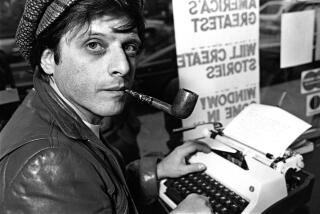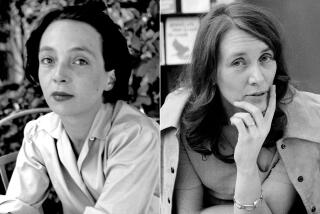The agony and the ecstasy
IN a supply-side England with social services dwindling, state medical authorities order the separation of 33-year-old conjoined twins with the expectation that the weakest of them will die. In a fictional village in the Caucasus mountains, a young woman escapes an encroaching civil war and flees to the nearest city, hoping that her soldier-lover will adhere to their appointed rendezvous at a certain cafe and spirit her away.
These two stories, so separate they could belong to different novels, unfold in alternating chapters for much of DBC Pierre’s second novel, “Ludmila’s Broken English,” a book as impossible to predict as it is to put down. The first follows the twins, the newly sex-crazed Blair and the recalcitrant Gordon (a.k.a. Bunny) as they leave the institution where they have spent their lives and navigate London’s apocalyptic haze of nightclubs and elusive women. The second tracks the wild-eyed woman from the Caucasus, Ludmila Derev, as she watches vainly from the window of a room she rents for a lover who never arrives. When it turns out this room comes at a price that can’t be paid in currency -- Ludmila must submit her digitized picture to be displayed on a website where she will be hawked as an Internet bride -- you may think you’ve guessed the mechanism by which Ludmila and the twins’ paths will merge.
But you will have guessed wrong.
“Ludmila’s Broken English” is a book of fantastical insults, dizzying schemes and trickery; a story about characters who dupe each other written by an author who almost diabolically misleads his readers. This delirious narrative floats somewhere outside literal written words. It’s as if when you open the covers, Pierre’s cartoonish figures bubble up to act out dramas in some alternate dimension, a reality that will disappear. Yet if these characters are indeed cartoons, drawn with big pens in bright colors, they are neither one-dimensional nor unbelievable, and never come off as stilted or false. Ludmila, Blair and Bunny may live in different worlds, but they have all been plopped into a landscape of American-fueled wars and global exploitation, and Pierre means to make you taste their suffering.
This is not a painful thing exactly, although throughout “Ludmila’s Broken English,” people die casual deaths at regular intervals. In the beginning, however, the people getting killed are those you’ve been conditioned not to like -- the man who inhales his granddaughter’s glove and chokes just as he’s preparing to rape her; the Kalashnikov-brandishing nephew of a bossy depot manager. Ludmila batters all the right people with her cleverly spiked retorts, which are rendered in an English that we soon come to understand is really just a variant of Russian. She also vanquishes thieves, charms bartenders and shames a young woman into offering up her vodka for a bonding ritual. “If you’re serious, and not just leading me up the backside with your innocent city ways,” she instructs, “we should drink it with open chests, to display our pride at this crossing of our paths.”
Like other scenes in “Ludmila’s Broken English,” this drinking party moves nothing in particular along; it just exists, shimmering and goofy, as a moment. The same is true of a passage in which the twins dance a tango -- “a dry, strict tango, as fast as a motor” -- before a dumbstruck audience in a nightclub for no better reason than to establish themselves as a species apart from the rest of the world. Pierre fills his book with many such odd delights, and nowhere more than in his dialogue. He has a knack for the rhythms of idiomatic speech: Bunny dismisses his brother as a “fascist tosspot” who takes on “swanny airs,” and Ludmila’s mountain dialect is a vernacular every bit as authentic. Her broken English -- “Ayem plisttomityu,” she tells her drinking buddy -- comes off as just that.
This writing, this vigorous, manic, swoonily melodic dialogue, allows you to waft through “Ludmila’s Broken English” even as warring troops march up the snowy mountains to Ludmila’s village, where, in a magically absurd twist, the frail Bunny and foolish Blair have found themselves trapped. And when the novel turns brutal -- a turn that would be predictable were it not for Pierre’s ploys -- it feels as if you’re being cleanly disemboweled with a samurai sword. You know something has gone terribly wrong, but you can’t immediately detect exactly why or how. Only in looking back through the book, or better yet rereading it, do you realize that you’ve been a victim of your expectations about how a piece of fiction should work out.
“Ludmila’s Broken English” is not “Vernon God Little,” Pierre’s 2003 debut, which won a raft of awards, including the Man Booker Prize. (Afterward, the 45-year-old Pierre, born in Australia as Peter Finlay, was revealed to have been a swindler and drug addict before his reincarnation as a novelist; he ended up using much of his Booker money to make amends.) That novel was set in America and told the story of a teenager wrongly condemned in a school shooting. Although “Ludmila’s Broken English” is similarly preoccupied with casual cruelty and injustice and just as bleakly hilarious, it lacks the perfect arc of its predecessor, and the loopy metaphors Pierre weaves into his characters’ speech here stray a few steps beyond Vernon’s vibrant colloquialisms. It’s as if Pierre is showing off his ear for language almost too flagrantly, and betraying too much glee in his pranks.
But this out-on-a-limb quality is precisely what makes his new book such a wonder, along with Pierre’s courage to construct a plot with uncertain logic that may leave many a reader puzzling late into the night. Throughout the novel, Pierre plays tricks on our sentiments: When Blair crumbles after a girl he’s imagined keeping as a sex slave shrieks with horror at his advances, or Ludmila begins to miss the bickering family she has left in the mountains -- she pines for “arguments that, for all their poison, were as comfy as powdered scarves” -- we sense our moral and emotional preconceptions starting to slip. Pierre does not make it easy, or even possible, to decide which characters deserve sympathy and which deserve to die; in that, he reminds us that war and death choose their victims more capriciously than fiction writers do, and most of humanity lies beyond our judgment. This is not, in other words, a feel-good book. It is, however, a rapturously involving one.
Shortly after their release from the institution, the twins meet a man of mysterious origin who talks to them of great opportunities and lures them with a psychedelic powder that flashes red, white and blue as it effervesces in liquid. The powder gives them courage; it gives them the capacity to forgive. Like religious faith, it strips away fear and conscience, and sends them trustingly into places where they’re ill-prepared to survive. And in the end, this unpredictable potion drives the story to a conclusion that seems to defy all narrative justice.
Tragically, however, “Ludmila’s Broken English” does not defy the reality so vividly rendered for us on the front pages of our newspapers, in colorful photos of mangled limbs and burning city blocks. Perhaps Pierre means to wake us from our stupor, to shock us with the violence we have become inured to. If so, he is just crafty enough to know that he has to seduce us first. *
More to Read
Sign up for our Book Club newsletter
Get the latest news, events and more from the Los Angeles Times Book Club, and help us get L.A. reading and talking.
You may occasionally receive promotional content from the Los Angeles Times.






